About our training process...
Choose a card below for a quick look at 3 kinds of CSSO training and how we break it up into teaching modules.
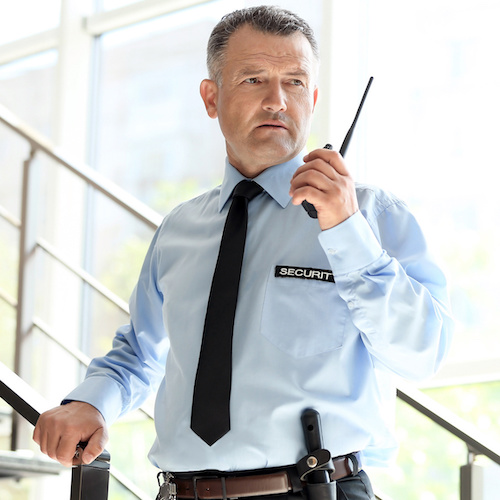
60 Hour Initial Training
Initial Commissioned School Security Officer Training requires 60 hours on a variety of topics.
Click for Details
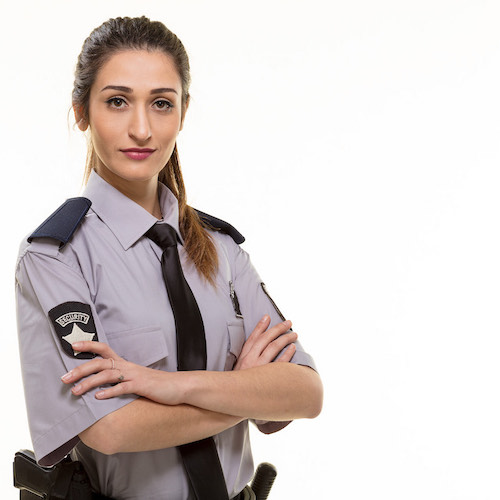
24 Hour Refresher Training
The CSSO is required to take 24 hours Refresher Training between 2 year license renewals.
Click for Details
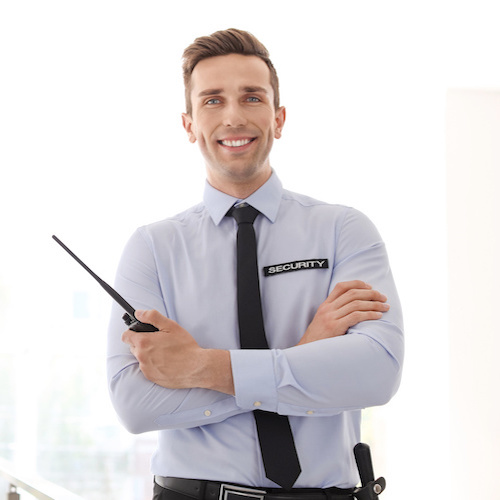
24 Hour Renewal Training
Every 2 years the CSSO is required to take 24 hours of Renewal Training and renew their CSSO license.
Click for Details
60 Hour Initial Training
These are the basics of the 60 hours of INITIAL training.
Academics

Academics include
Arkansas Law and Act 393, Use of Force, Report Writing, Case Studies, Mindset, Conflict Deescalation and Resolution, and more.
Click here to find out why our Academic Presentations are better.
Our presentations stand out because of one word: ENGAGEMENT.
We recognize the weariness of being "PowerPointed to death." At Get Trained Be Ready, we ensure our training sessions are far from the same old grind. Our instructors are not only informative but also strive to make the material both relevant and captivating.
We incorporate discussion questions to delve deeper into topics, fostering interactive dialogue. These discussions often lead to further exploration with additional questions. Our approach includes report writing exercises, challenging participants to articulate their findings.
Moreover, our Commissioned School Security Officers get opportunities to research past and current active shooter events, providing ample presentation opportunities to discuss these occurrences.
Regardless of the training content or venue, we actively involve CSSOs in our sessions, ensuring their engagement and participation throughout.
Range Days
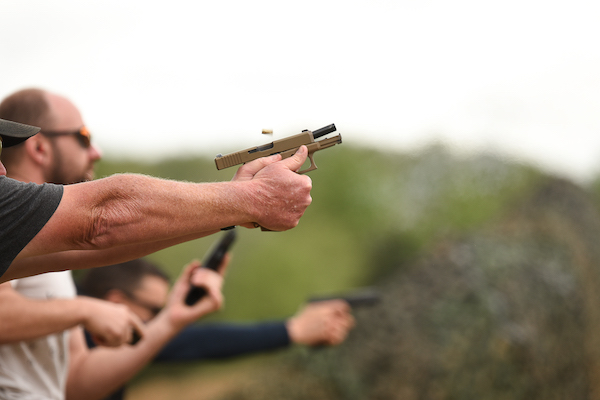
Range Days are based around
Weapon Safety, Defensive Shooting Techniques, Shooting Qualifications, Firearms Maintenance, and more.
Click Here to find out what makes our Range Days more relevant.
Our Range Days aren't solely about meeting qualifications. Simply achieving a minimum CLEST score of 400 for an officer isn't our aim. Instead, we prioritize ensuring that Commissioned School Security Officers are not just acquainted, but comfortable with carrying their firearms, and competently employing their firearms if that need should arise. That's why our training days feature a high round count.
Live fire training is irreplaceable and we teach that all shooting is a Balance of Speed and Precision. It's through this hands-on experience that CSSOs learn crucial skills like recoil mitigation, target reacquisition, and cultivating a defender's mindset. Through our extensive work with hundreds of students on the range, we've observed that competency breeds confidence.
Ultimately, success as a defender hinges on confidence in one's abilities and a clear understanding of their limitations.
Medical Training
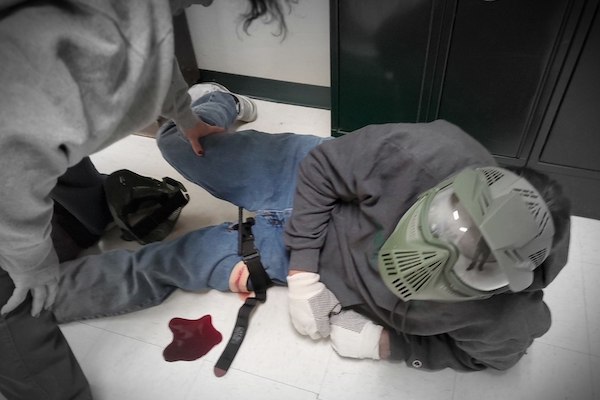
Medical Training has several facets
including Cardiopulmonary Resuscitation (CPR), Automated External Defibrillator (AED) use, Triage and Wound Management for Active Shooter Events, Integrated Response, and more.
Click here to find out more about the high quality of our Medical Training.
Medical training is paramount in active shooter situations for several crucial reasons:
Immediate Response: In the chaotic aftermath of an active shooter incident, medical personnel might not immediately have access to the scene. Individuals trained in basic medical techniques can provide life-saving care to victims until professional help arrives, significantly improving their chances of survival.
Controlled Bleeding: Gunshot wounds often result in severe bleeding, which can be rapidly fatal if not addressed promptly. Medical training equips individuals with the skills to control bleeding using techniques such as direct pressure, tourniquet application, and wound packing, effectively stemming blood loss and saving lives.
Airway Management: Injured individuals may experience compromised airways due to blood or other obstructions. Proper training enables responders to assess and manage airways, ensuring that victims can breathe freely until they receive advanced medical care.
Circulation Support: Cardiac arrest is a potential complication of severe trauma. Medical training includes instruction on cardiopulmonary resuscitation (CPR) and the use of automated external defibrillators (AEDs), enabling responders to initiate life-saving measures and maintain circulation until professional medical assistance arrives.
Psychological First Aid: Active shooter incidents can cause profound emotional distress and trauma to survivors and witnesses. Medical training incorporates elements of psychological first aid, empowering responders to provide compassionate support and assistance to those affected by the trauma.
Resource Optimization: In mass casualty incidents like active shooter situations, medical resources may be overwhelmed. Trained individuals can help optimize resource allocation by providing immediate care to the most critically injured, thereby maximizing the chances of survival for all victims.
Personal Safety: While providing medical assistance, responders must prioritize their own safety to avoid becoming additional casualties. Medical training includes guidance on situational awareness, scene assessment, and personal protection measures, ensuring that responders can effectively render aid while minimizing their own risk.
In summary, medical training is essential in active shooter situations to provide timely and effective medical care, improve survival outcomes for victims, optimize resource utilization, and ensure the safety of both responders and those in need of assistance.
Active Shooter Training
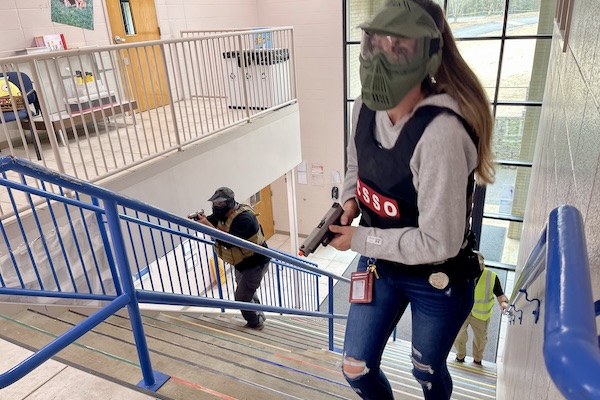
Putting it all together
At this point CSSOs have the knowledge and skills to Stop the Killing, Stop the Dying, and make ready for the arrival of First Responders by preparing the casulaties for Rapid Evacuation. Now it's time to test those skills.
Click Here to find out what makes our Active Shooter Training so comprehensive.
We have found that armed response training with airsoft provides a valuable hands-on experience, allowing CSSOs to develop and refine their skills in a controlled yet realistic environment.
1. Safety First: - We emphasize strict safety protocols. All participants will wear appropriate protective gear, including eye protection, to minimize the risk of injuries. - We clearly define the rules of engagement to ensure a safe and controlled training environment.
2. Simulation Setup: - We design realistic scenarios based on potential threats in your specific environment and use airsoft weapons that closely resemble actual firearms. - We establish designated areas for active shooter scenarios.
3. Scenario Planning: - We develop various scenarios that mimic real-life situations on your premises, considering factors such as layout, entrances, and potential hiding spots. - Elements are incorporated such as simulated gunfire, loud noises, and realistic props to enhance the authenticity of the training. - Scenarios are dynamic and unpredictable to challenge CSSOs and reinforce adaptability.
4. Role of CSSOs: - We use your team of CSSOs to play the roles of armed responders and we provide active shooter role players.
5. Communication and Coordination: - We emphasize effective communication and coordination among armed responders. We want to use radios or other communication devices if available. - We also discuss relaying critical information to law enforcement upon their arrival.
6. Use of Force Decision-Making: - We discuss and practice the principles of the use of force, emphasizing de-escalation when possible. - CSSOs are trained to make split-second decisions on whether to engage or not, considering the safety of themselves and others.
7. After-Action Review: - Immediate after-action reviews for each scenario are part of training.We discuss what went well, areas for improvement, and lessons learned. - Occasionally, we use images or video to better dissect the scenario.
8. Law of Self Defense: - We address the legal and ethical aspects of using force. We insure CSSOs understand the laws governing self-defense and the use of firearms.
9. Continuous Training: - Schedule regular training sessions to maintain and enhance skills. - Keep scenarios dynamic and unpredictable to challenge participants and reinforce adaptability.
10. Feedback and Improvement: - We encourage feedback from all participants to continuously improve the training program and we adjust scenarios based on feedback and changing school security dynamics.
Finishing Up
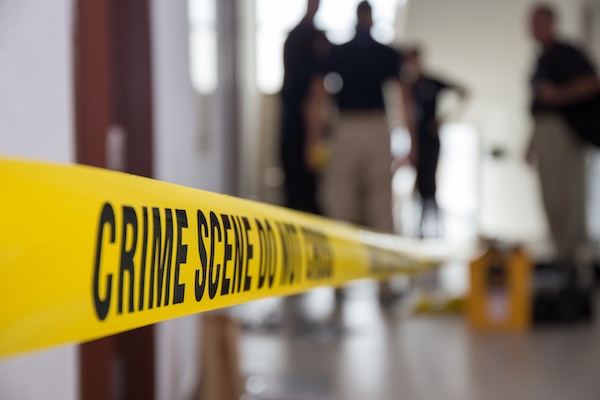
We wrap it up with last minute details comprising
Question & Answer sessions reviewing all training days, Arkansas State Police mandated testing, initial application paperwork completion, electronic fingerprints, and a host of other details have to be done.
If you are wondering about our recommended firearms for CSSOs, Click Here to download the pdf.
24 Hour Refresher Training
These are the basics of the 24 hours of REFRESHER training.
Academics

Academics are minimal
in Refresher Training. Items covered are all of a practical nature and are based around law or rule changes, ALERRT updates, and discussions on practical exercises.
Click here to find out why our Academic Presentations are better.
Even during Refresher Training, we prioritize academic engagement. Whether it's on the range, through after-action reality based training analysis, or research of current active shooter events still in the news, we keep our discussions dynamic and relevant to the tasks at hand.
Our commitment to involving Commissioned School Security Officers (CSSOs) ensures their active participation and engagement throughout the sessions, regardless of the content or venue.
Range Days
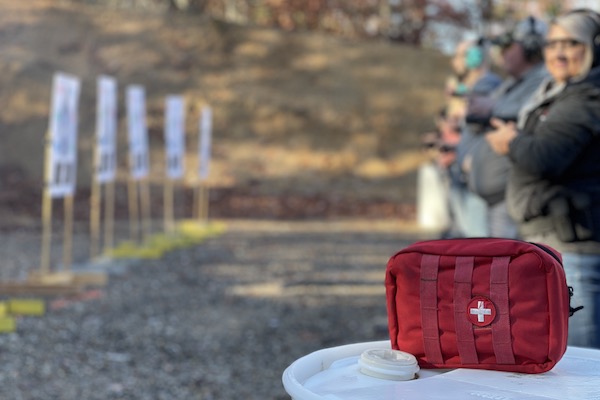
Range Days are (again) based around
Weapon Safety, Defensive Shooting Techniques, Shooting Qualifications, Firearms Maintenance, but we push a little farther and run a little harder.
Click Here to find out why our Refresher Range Days are so applicable.
Our CSSO Refresher Training Range Days continue to exceed basic qualification standards. Our focus is on enhancing the familiarity and proficiency of Commissioned School Security Officers with their firearms, especially in challenging situations. That's why our training again includes rigorous live fire exercises with high round counts.
We follow the Plausibility Principle, urging participants to navigate realistic scenarios and responses as we push farther into less likely, but still plausible, shooting scenarios. We reinforce the importance of the Balance of Speed and Precision in shooting, expecting participants to further understand their capabilities and build more confidence in their skills.
Medical Training
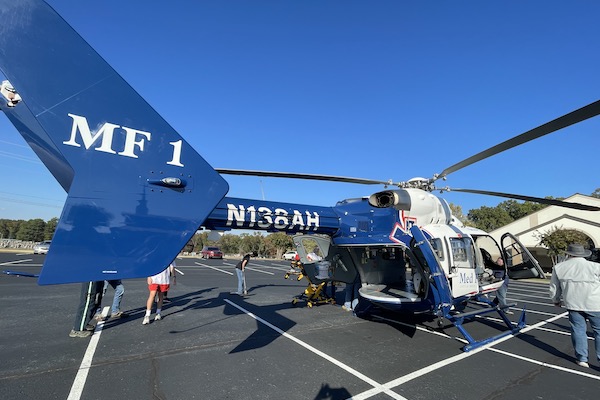
Medical Training has a different role
In Refresher Training, the role of Medical Training takes a distinct focus. We presume and incorporate CPR, AED use, and stop-the-bleed techniques, tailoring their application to the specific context of active shooter events.
Click here to find out more about how our Medical Training is used in Refresher Training.
In Refresher Training, medical training assumes a unique role tailored to the demands of active shooter situations. While CPR, AED use, and stop the bleed techniques are foundational skills, their application is specifically honed and contextualized for the high-stress, time-sensitive environments typical of active shooter events.
CSSOs are trained to swiftly and effectively administer life-saving interventions amidst chaotic conditions, ensuring optimal outcomes for victims in critical need of medical assistance.
Active Shooter Training
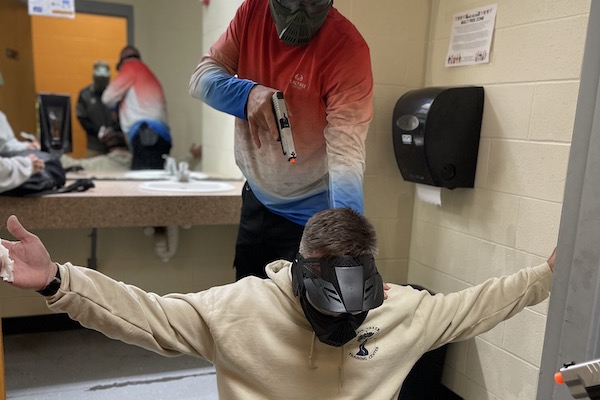
Putting it all together (again)
CSSOs should STILL have the knowledge and skills to Stop the Killing, Stop the Dying, and make ready for the arrival of First Responders by preparing the casulaties for Rapid Evacuation. We are going to test those skills again while we drive a little harder and increase expecations.
Click Here to find out what makes our Active Shooter Training all-inclusive for Refresher Training.
CSSOs play a pivotal role in active shooter incidents, where every moment is critical. Their responsibilities extend beyond mere security to become frontline responders in the face of danger. Central to their mission is the imperative to halt the violence, prevent additional casualties, and prepare victims for evacuation, all while ensuring their own safety.
"Stop the Killing" encapsulates the urgent need to intervene decisively, employing tactics to neutralize the threat and prevent further harm to innocent individuals. This may involve confronting the shooter directly, barricading doors to prevent their advance, or guiding others to safety away from the danger zone.
"Stop the Dying" underscores the importance of immediate medical intervention to stabilize injured individuals and prevent fatalities. CSSOs must be proficient in basic life-saving techniques such as CPR, AED use, and stop-the-bleed procedures, applying these skills swiftly and effectively to maximize survival chances for those wounded in the attack.
"Make ready for the arrival of First Responders" emphasizes the critical role CSSOs play in preparing the scene for the arrival of professional emergency responders. This includes providing accurate information about the situation, securing the area to prevent further threats, and preparing casualties for rapid evacuation to medical facilities.
In our upcoming training sessions, we will drive CSSOs to excel in these essential tasks under heightened expectations. Through rigorous simulations and scenario-based exercises, we will challenge them to demonstrate proficiency in stopping the violence, mitigating casualties, and facilitating rapid evacuation, ensuring they are fully prepared to respond effectively to the most demanding situations and safeguard lives under pressure.
Finishing Up
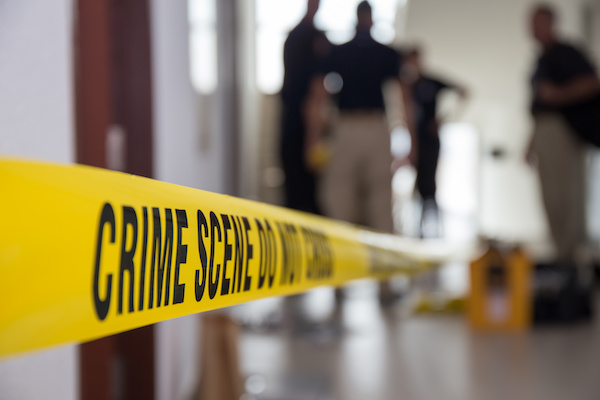
Wrapping up last minute details
is pretty quick with Refresher Training. We spend the end of each day unpacking details of the best (and maybe the not best) moments in training.
Paperwork is pretty minimal for Refresher Training, no passport photos, background checks, or applications needed. Just a simple Refresher Training form.
If you are wondering about our recommended firearms for CSSOs, Click Here to download the pdf.
24 Hour Renewal Training
These are the basics of the 24 hours of RENEWAL training.
Academics

Academics are more relevant
in Renewal Training. Arkansas Law and Act 393 updates, Use of Force, updated Case Study discussions, and more.
Click here to find out why our Academic Presentations get better over time
We engage in thorough evaluations of Arkansas Law and actively participate in legislative sessions, offering recommendations to enhance the program's effectiveness. This gives us a firsthand look at how the program evolves.
This means we have a good understanding of current law and rules during Renewal training. We spend time with CSSOs reviewing any updates in Arkansas Law related to Act 393 and the Arkansas State Police Rules, particularly as those laws and rules impact the CSSO program.
Range Days
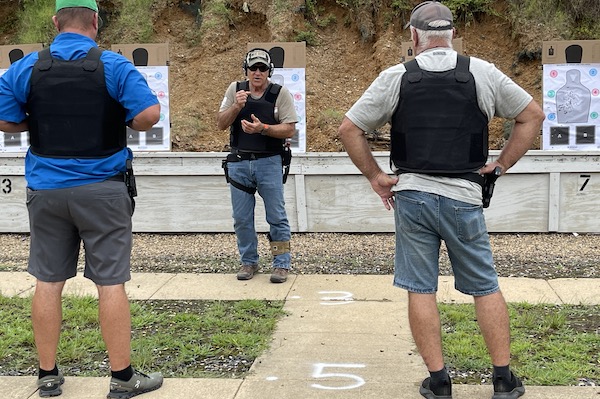
Range Days are still important
and our focus remains comprehensive, covering Weapon Safety, Defensive Shooting Techniques, Shooting Qualifications, and Firearms Maintenance.
Click Here to find out why Range Days become more important every year.
On Range Days, However, our approach transcends mere qualification standards. Our expectations grow every year for your team's continued skill development.
We maintain a high round count during our training days, recognizing the invaluable benefits of live fire exercises. Continued exposure to diverse shooting scenarios on the range equips CSSOs with the necessary skills to respond efficiently in life-threatening situations.
Our CSSO Renewal Training Range Days consistently exceed basic qualification standards. We challenge participants with rigorous live fire exercises, urging them to navigate realistic scenarios and responses. Through this immersive training, we empower CSSOs to confidently fulfill their pivotal role in safeguarding their school communities.
Medical Training
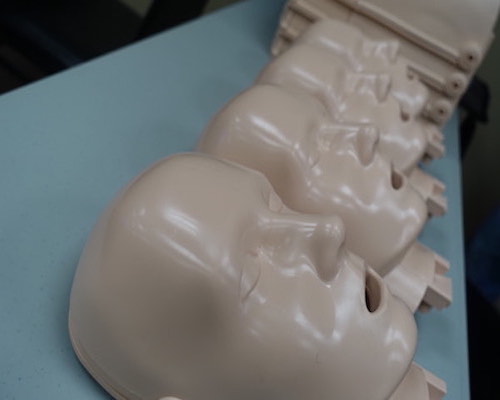
Medical Training has a
shelf life and those medical certs must be renewed every 2 years. Triage, Wound Management, and our American Heart Association CPR program has to be retaken to maintain proficiency.
Click here to find out how we keep Medical Training updated and interesting.
As CSSOs renew their certifications, we reemphasize the fact that medical training is vital in active shooter situations for several reasons:
1. Immediate Response: Trained individuals can provide life-saving care until professional help arrives, improving survival chances.
2. Controlled Bleeding: Techniques like direct pressure and tourniquet application save lives by stemming severe bleeding from gunshot wounds.
3. Airway Management: Training enables responders to maintain clear airways, crucial for victims to breathe until advanced care is available.
4. Circulation Support: CPR and AED use can prevent cardiac arrest and maintain circulation until medical help arrives.
5. Psychological First Aid: Training empowers responders to provide compassionate support to those affected by trauma.
6. Resource Optimization: Trained individuals help allocate resources effectively in mass casualty incidents, maximizing survival chances.
7. Personal Safety: Guidance on situational awareness and personal protection ensures responders can help while minimizing risks.
In summary, medical training ensures timely care, improves survival rates, optimizes resources, and enhances safety in active shooter situations.
Active Shooter Training
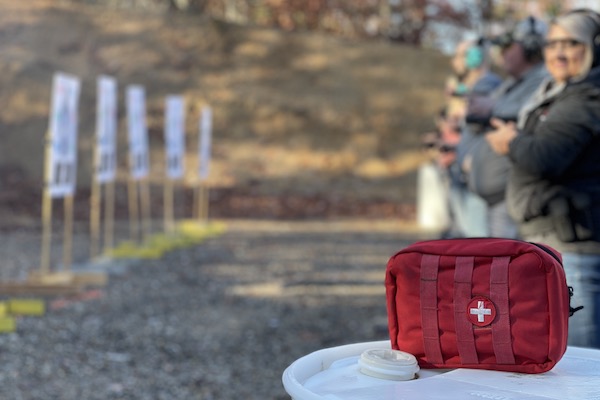
The Active Shooter component
will be shorter in Renewal Training due to the additional time allocated for Medical Training and Academics.
Click Here to find out what Active Shooter Training to expect in Renewal Training.
Expectations remain unchanged regarding what actions to take and when to take them in response to an active shooter situation.
Renewal Training may incorporate a higher number of Shoot/Don't Shoot range targets, providing participants with practical scenarios to reinforce decision-making skills under pressure.
Additionally, discussions on current Active Shooter events help participants stay informed and learn from real-world incidents. Depending on available time after Range and Medical Days, additional training on relevant topics may be included to further enhance preparedness and response capabilities.
Finishing Up
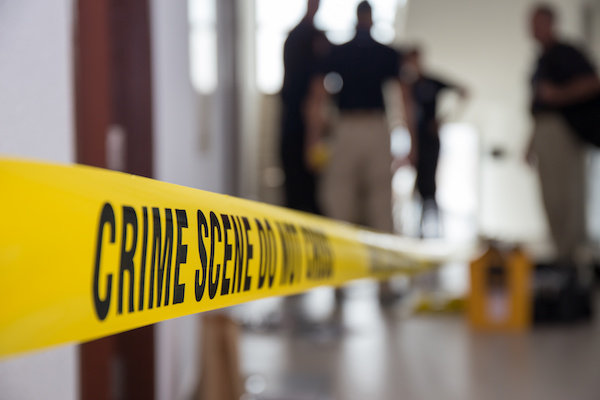
We wrap it up with lots of paperwork
including new photo ID images, new Renewal application paperwork completion, electronic fingerprints, and all the other detailed information that goes with renewing a CSSO license.
If you are wondering about our recommended firearms for CSSOs, Click Here to download the pdf.
Is Your School Prepared?
Any plan works well on days the killer does not attack…But there needs to be a plan for the day the killer does attack. It starts with defining what you want the outcome to look like after the attack is over, specifically, the body count. After defining the desired outcome, a realistic plan can be developed to reach that outcome.
If the focus is on the plan and not the desired outcome, we include things we are comfortable with, things we personally like, things other schools are doing, things we have always done, things that are not controversial, things that require less work, things that are inexpensive. We exclude things we are not comfortable with, things we do not like, things that might be controversial, things that cause more work, things that may cost more.
To be clear, an active shooter attack is Combat and there will be casualties…
CLICK HERE to download the professional White Paper written by one of our instructors.
We can design a program for YOUR school district.
Together, let's put a plan in place to make your school safer for your staff and your students.
